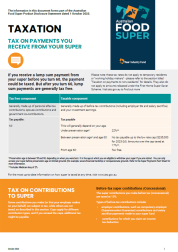TAX ON PAYMENTS YOU RECEIVE FROM YOUR SUPER
If you receive a lump sum payment from your super before you turn 60, the payment could be taxed. But after you turn 60, lump sum payments are generally tax free.
Please note: these tax rates do not apply to temporary residents or “working holiday makers” – please refer to the section below titled “Taxation on payments to non-residents” for details. They also do not apply to amounts released under the First Home Super Saver Scheme. Visit ato.gov.au to find out more.
| Tax free component | Taxable component |
|
| Generally made up of personal after-tax contributions, spouse contributions and government co-contributions. | Generally made up of before tax contributions (including employer SG and salary sacrifice) and your investment earnings. | |
| Nil | This will generally depend on your age. | |
| Under age 60: | 22%* | |
| From age 60: | Tax free | |
*Includes Medicare levy of 2%.
For the most up-to-date information on how super is taxed at any time, visit www.ato.gov.au
TAX ON CONTRIBUTIONS TO SUPER
Some contributions you make (or that your employer makes on your behalf) are subject to tax, while others are not taxed, as described in this section. Caps apply for different contribution types, and if you exceed the caps, additional tax might be payable.
Before-tax super contributions (Concessional)
The super contributions you make before tax (concessional) are taxed at 15%.
Types of before-tax contributions include:
- employer contributions, such as compulsory employer (Superannuation Guarantee) contributions and salary sacrifice payments made to your super fund
- contributions for which you claim an income tax deduction
After-tax super contributions (Non-concessional)
The super contributions you make after tax (non-concessional) are not subject to tax.
Types of after-tax contributions include:
- contributions you or your employer make from your after-tax income
- contributions your spouse makes to your super fund
- personal contributions that are not claimed as an income tax deduction. If you make personal contributions and claim a tax deduction against those contributions, they will be taxable as concessional contributions and count towards your concessional contributions cap
Contribution caps
There are limits on the amount of before-tax and after-tax contributions you can make each year, and these may vary depending on the financial year and your age.
If you exceed these limits, you may have to pay extra tax.
If you exceed the before-tax (concessional) super contributions cap ($30,000 p.a. for 2024-25, indexed), the excess is included in your income tax return and taxed at your marginal tax rate. You can choose to withdraw some of the excess contributions to pay the additional tax. Alternatively, if your total superannuation balance is under $500,000, you can carry forward any unused portions of the cap into later financial years for up to five years.
If you exceed the after-tax (non-concessional) super contributions cap ($120,000 p.a. for 2024 -25, indexed), you can choose to withdraw the excess contributions and any earnings. The earnings are then included in your income tax assessment and taxed at your marginal rate. If you don’t withdraw the earnings, the excess is taxed at 47%.*
Depending on your age and balance, you may be eligible to make payments totalling up to 3 times the non-concessional cap in a single year. This is known as the ‘bring-forward rule’.
The non-concessional cap does not include “downsizer contributions”, which may be available to members contributing proceeds of the sale of their home.
For more information on contribution caps, read the Contributions Fact Sheet at ausfoodsuper.com.au/factsheets or visit www.ato.gov.au.
* Plus the medicare levy.
Division 293 tax for high-income earners
Division 293 tax is an additional tax on super contributions if your combined income and super contributions are more than the threshold.
The rate of Division 293 tax is 15%. See ato.gov.au for more information.
Government Co-contribution
There is no tax payable on any amount you receive as part of the Government Co-contribution scheme.
Rollover/transfer from another superannuation fund
In most cases, there is no tax payable if you transfer or rollover an amount from another superannuation fund into Australian Food Super. The exception is if the transfer is coming from an untaxed superannuation fund. Some Government superannuation funds, for example, are untaxed funds. This is where members are taxed at higher rates at the time of receiving a benefit payment.
If you transfer from an untaxed fund into Australian Food Super any taxable amount transferred will have 15% contributions tax deducted from it.
Deductible expenses
Deductible expenses such as administration related fees or insurance premiums are allowed as a tax deduction to the fund. Australian Food Super claims these amounts as deductions when lodging the fund’s tax return. This tax benefit is paid into the administration reserve of the Fund and is used for the benefit of the membership as a whole by assisting in meeting the operational costs of the Fund.
Providing your Tax File Number (TFN)
Under the Superannuation Industry (Supervision) Act 1993, your superannuation fund is authorised to collect, use and disclose your tax file number.
The trustee of your superannuation fund may disclose your tax file number to another superannuation provider, when your benefits are being transferred, unless you request the trustee of your superannuation fund in writing that your tax file number not be disclosed to any other superannuation provider.
Declining to quote your tax file number to the trustee of your superannuation fund is not an offence. However giving your tax file number to your superannuation fund will have the following advantages:
- your superannuation fund will be able to accept all permitted types of contributions to your account/s;
- other than the tax that may ordinarily apply, you will not pay more tax than you need to – this affects both contributions to your superannuation and benefit payments when you start drawing down your superannuation benefits; and
- it will make it much easier to find different superannuation accounts in your name so that you receive all your superannuation benefits when you retire.
Tax of death benefits
When a death benefit is paid to a dependant (as defined by the Income Tax Assessment Act 1937), no tax is taken out of the benefit by Australian Food Super. Likewise, no tax is taken out where a benefit is paid to a member’s estate or placed in trust for an under-age child.
However, a person defined as a “dependant” under superannuation regulations may not be treated as a dependant under the tax system. For example, an adult child may be considered a dependant under superannuation law, but not under the Tax Act. A benefit paid to an estate may be subject to tax when dealt with by the estate.
Any tax payable for a non-dependant will generally be taken out at the rates shown below.
| Age of deceased | Death benefit type | Age of recipient | Taxation |
| Any age | Lump sum | Any age |
Tax free component is tax free Taxable component is taxed at 17% (includes Medicare levy). |
Taxation on payments to non-residents
Where a Departing Australia Superannuation Payment (DASP) is being paid then special rates of taxation apply to the benefit payment. A DASP payment is where the person applying for the payment was a temporary resident (working visa) or Working Holiday Maker (e.g. backpacker).
Different rates of taxation will apply depending on your visa. The rates of tax at 1 July 2024 are as per the table below. You should visit ato.gov.au/DASP for more information.
DASP tax rates
| Payment component | DASP ordinary tax rate (for nonworking holiday maker) | DASP working holiday maker tax rate (417 working holiday visa, 462 work and holiday visa, etc.) |
| Tax-free component | No tax | No tax |
| Taxable component – taxed element | 35% | 65% |
| Taxable component – untaxed element | 45% | 65% |
Multiple visa holders
If you held a WHM visa and another type of visa, the tax rate that applies depends on your visa status at the time the contributions were made. The application process (either online or using a paper form) will allow you to advise the type of visa you held at a particular time and the rate of taxation applicable to the type of visa you held will be applied proportionately to the benefit.
Australian Food Super recommends you obtain financial advice tailored to your personal circumstances to understand how tax may apply to your situation.
If you require a printed copy of this Fact Sheet please contact the Member Hotline on 1800 808 614.
Download the Fact Sheet
Taxation
If you require any assistance, or would like a printed copy of this or any fact sheet, please contact the Member Hotline on 1800 808 614


